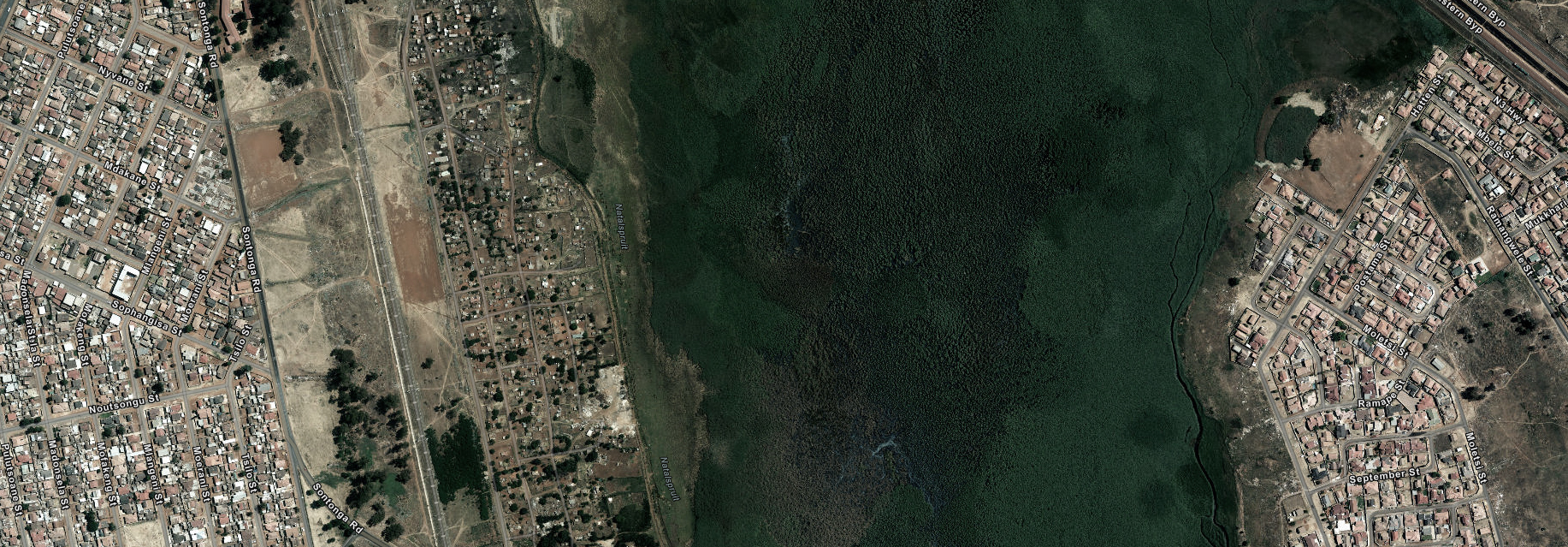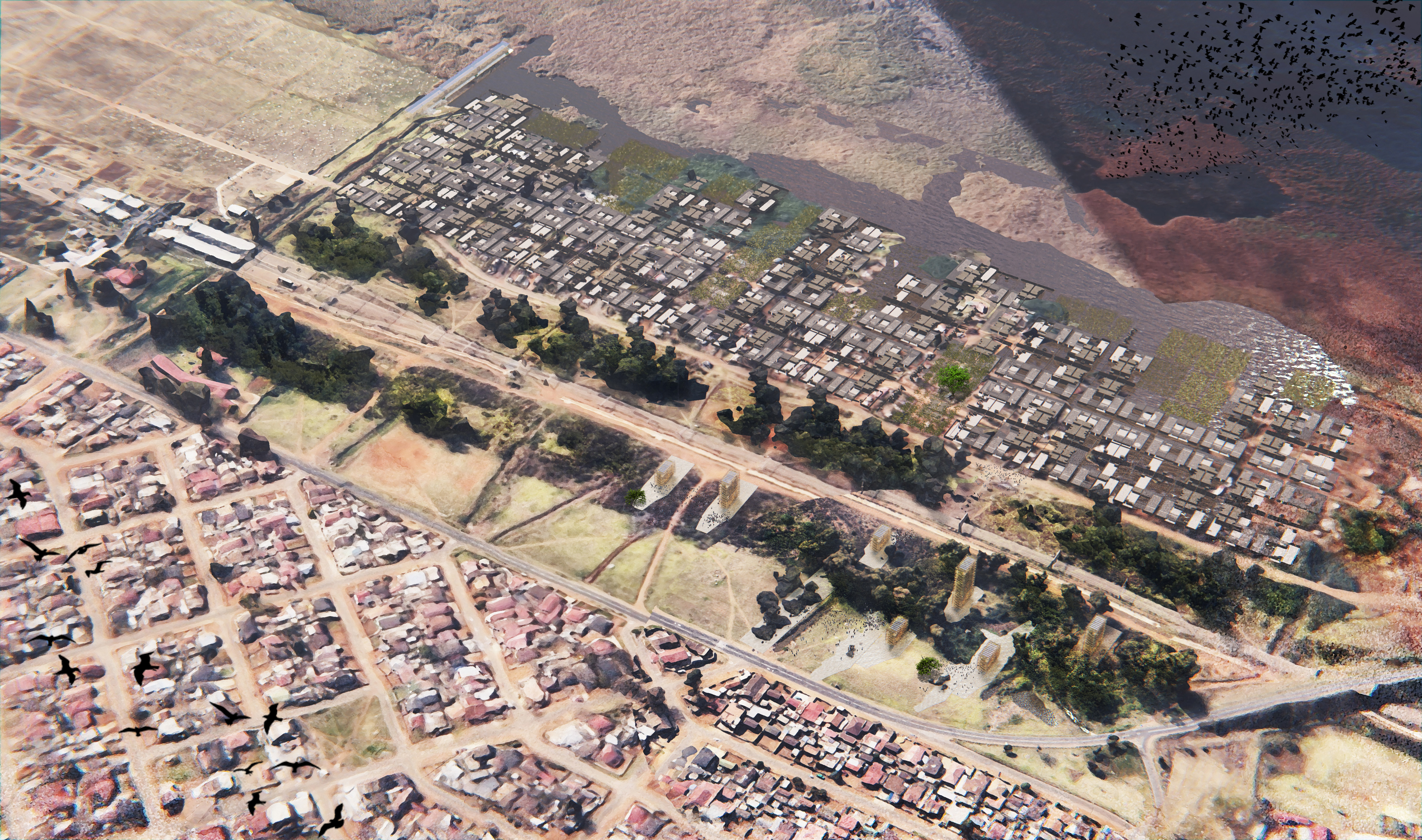3N GARDEN VILLAGE
Katlehong
Ekurhuleni
2020
Katlehong
Ekurhuleni
2020
The
3N Garden Village proposal in Katlehong, Ekurhuleni, to enhance river
filtration and flood regulation: supports integrated water management of small
to medium enterprises - considering a “cross-insured” urban agriculture
reforestation programme to reinforce ecological infrastructure along the
riparian corridor.

The effects of climate change are already being felt in many parts of the world. Rising temperatures, changing rainfall patterns and increasing frequency of extreme events such as floods and droughts have disrupted livelihoods and food security for millions of people. The negative impacts of climate change will be exacerbated in many cases by other factors such as population growth and urbanisation, which can drive increased water stress and degrade ecosystems.
Our approach to development is based on the idea that equity and resilience are not mutually exclusive. We believe that by providing people with access to resources, we can help them build sustainable communities that are both economically and environmentally sound.
We focus on creating ownership so that people have a stake in their own community's future. We also work to create opportunities for local businesses and governments to work together toward shared goals. We believe the best way to achieve these goals is through systemic approaches that facilitate social-ecological resilience, rather than top-down programs that rely on centralization of power. These approaches emphasize inclusivity and health in addition to economic growth.
We have interventions across sustainable value chains where we address challenges applying multi-disciplinary, multi-sectoral approaches. We frame these interventions as green growth initiatives with an emphasis on biodiversity regeneration of ecosystems as well as outcomes and impact assessment attention paid to engagement with intended grassroots beneficiaries whose quality of life index is low vulnerability to global environmental degradation.
The problem with traditional agricultural development approaches is that they focus on individuals, rather than communities. When we work with individuals, we cannot effectively address the underlying issues that cause poverty and hunger. We need to instead focus on helping our partners develop strong community institutions and systems for knowledge transfer between partners and preservation of knowledge through a centralized project database. This will allow us to upskill and support households and community-based farming enterprises in order to accelerate agricultural transformation from subsistence to viable commercial entities.


 Instead of displacing vulnerable communities from low-lying
settlements the programme would provide basic agricultural rights for household
farmers to generate livelihood incomes and develop a localised secondary
economy that is developed through conservation agriculture that supports river
and flood management.
Instead of displacing vulnerable communities from low-lying
settlements the programme would provide basic agricultural rights for household
farmers to generate livelihood incomes and develop a localised secondary
economy that is developed through conservation agriculture that supports river
and flood management.
Climate change is likely to reduce water availability in many regions of the world and increase pressure on the environment. In parts of Africa, Asia and Latin America, this will affect both rural and urban populations, with likely detrimental long-term implications for affected communities. The resulting environmental migration also intersects with the growth of informal settlements on city margins, exaggerating low living standards, rising inequality and limited water and sanitation access as well as exacerbating ecosystem degradation.
The garden village is a community of farmers, nutritionists, entrepreneurs and health workers. The main objective of the project is to train climate-smart agricultural practices that improve the nutrition and health of children and adults in the community. This will be done through training in good nutrition and health, business development and entrepreneurship, technical and soft skills on agro-processing. The activities will be embedded in the work of the farmers markets, incubator, farmer production units, health centres and schools.promote green growth through environmental stewardship and support smallholder and households to adequately produce their own food, enhance nutrition and promote food security, now and in the future. In order to ensure that our urban and rural areas are resilient to the effects of climate change, we need to establish a reforestation programme that will rehabilitate ecological infrastructure along riparian corridors. By doing so, we will be able to restore aquifer, river and reservoir renewal; filtration; and flood regulation.
Garden villages are a new way to accelerate agricultural transformation from subsistence to viable commercial entities. The key to this transformation is the support of households and community-based farming enterprises.
TRANSITION DESIGN
AEDI STUDIO BERLIN, JOHANNESBURG.
AEDI STUDIO BERLIN, JOHANNESBURG.